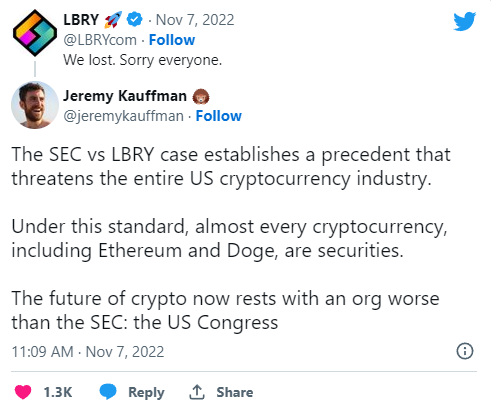News
What Could Happen if Ethereum is Declared a Security?
Summary: The cryptocurrency space is still in chaos after it was revealed that the FTX exchange is insolvent. Not only is this a disaster for anyone who held funds on FTX, but it also means that regulators might be much more strict with guidance for the cryptocurrency industry. In the worst-case scenario, this could include the ...
The cryptocurrency space is still in chaos after it was revealed that the FTX exchange is insolvent. Not only is this a disaster for anyone who held funds on FTX, but it also means that regulators might be much more strict with guidance for the cryptocurrency industry. In the worst-case scenario, this could include the declaration of Ethereum as a security, which would completely change the blockchain industry as we know it. Let’s take a look at what this would mean, how likely it is to happen, and other similar cases.
One of the biggest questions for any project in the cryptocurrency space is whether or not their token is a security. A security is an asset that represents ownership in some type of venture. The most common way to determine if an asset is a security or not is by evaluating it with the Howey Test, which states that an asset is a security if it is “an investment of money in a common enterprise with profits to come solely from the efforts of others.” The most common type of security is company stock, which is obviously an investment into a common enterprise (the business) with profits to come from those working at the business. When it comes to cryptocurrencies, it is ambiguous whether or not this definition applies.
Over the past few years, several different companies have come under fire for alleged violations of US securities laws by selling cryptocurrency tokens. The most prolific case has been that relating to Ripple Labs and XRP. The Securities and Exchange Commission, or SEC, alleges that Ripple Labs created a security when they made the XRP token and that their sale of the token was an unlawful securities offering. The SEC also just finalized a case against video-hosting platform LBRY and determined that the LBC token was in fact a security.

If a cryptocurrency is defined as a security, it severely limits how it can be utilized and where it can be traded. According to the Securities Act of 1933, all securities must be registered with the SEC and only traded on a registered exchange, like where traditional stocks are traded. This would be a massive blow to any crypto, as there are no cryptocurrency exchanges currently registered with the SEC, and liquidity for the token would dry up immediately as exchanges delist it. Moreover, it is unclear how decentralized exchanges would be regulated, but they could be required to collect KYC information from their users trading Ethereum.
Recently, SEC Chairman Gary Gensler has made comments suggesting he thinks Ethereum might have violated securities laws. This would be a huge blow to the entire cryptocurrency ecosystem for several reasons. First, if Ethereum is a security, then all US-based investors would only be able to buy it from specific registered exchanges, which would be a massive hassle along with potentially preventing withdrawals to the blockchain. Additionally, many of the projects building on Ethereum may also be accused of being securities and it could bring DeFi to a halt. Finally, if Ethereum, one of the most decentralized cryptocurrencies is deemed a security, a precedent is set to declare almost every other cryptocurrency as a security as well. This type of ruling could set the industry back years and possibly be unrecoverable.

Fortunately, it is quite improbable that Ethereum will be declared a security, especially in its current state. Former SEC director William Hinman has previously stated that he believes neither Bitcoin or Ethereum are securities, and even though this is his own opinion and not that of the SEC’s, it stands to reason that it would be considered or at least shared by others within the SEC. Additionally, Ethereum has difficulty passing the Howey test, as there is no one entity behind the entire blockchain’s success. Buying Ethereum is a belief in its global adoption, its continued development by dozens of independent global teams, and a bet on the continued growth and use of smart contracts.
Even in the unlikely scenario that Ethereum is initially deemed a security, there would be billions of dollars in lobbying done to contest and appeal the case by companies like Coinbase and Binance, both of which have made a fortune exchanging Ethereum under the impression that it is not a security. This would ensure that, just like in the XRP case, a settlement is not reached for several years, and in that time alternative solutions could be adopted to fix the issue.

It’s clear to see that the cryptocurrency space needs more regulation. However, if that regulation comes at the cost of innovation and rapid development, it will likely do more harm than good. Hopefully, the SEC sees the benefits of a global decentralized protocol like Ethereum and chooses to go after the real bad actors in the space.
By Lincoln Murr
Tags: Binance,Coinbase,DeFi,Ethereum,LBRY,Ripple,SEC,XRP
Link: What Could Happen if Ethereum is Declared a Security? [Copy]